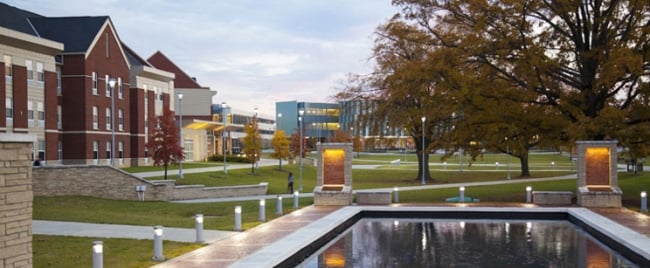You have /5 articles left.
Sign up for a free account or log in.

North Carolina A&T State University
NCA&T
The largest historically black university in the U.S. wants to grow even larger, and the university's leaders believe online education can help them get there.
North Carolina Agricultural & Technical State University last year edged past Florida Agricultural & Mechanical University to claim the title of the country’s largest historically black university, but it did so by staying put. Florida A&M’s enrollment has fallen; North Carolina A&T’s has hovered below 11,000 students for nearly a decade. This fall, once again, enrollment sits at 10,875, a slight increase of 141 from the previous year.
As the university aspires to reach 13,500 students by 2020 and 15,000 in the following decade, academic leaders see diversity -- both in demographics and academic offerings -- as a path to growth. That includes creating new online programs, as well as marketing to working adults, members of the military and students who left college before they could graduate -- all initiatives that would make the university less dependent on the traditional college-age student. The news was first reported by the Greensboro News & Record.
“We can’t just solely focus on the base we’ve had in the past,” said Joe. B. Whitehead Jr., provost and vice president for academic affairs. “In order to help enrollment grow, we have to look at different mechanisms to engage students in general. We can’t solely focus on the traditional 18- to 22-year-old.”
Historically black colleges and universities (HBCUs) have traditionally been slower than other institutions to create online courses and programs. Some high-profile attempts to do so, such as Pearson’s partnership with Howard University, have fallen apart. But as HBCUs -- and indeed much of higher education -- contemplate how to stay relevant in the face of financial challenges and demographic shifts, online education continues to climb on their list of proposed strategies.
“Often HBCUs are asked to defend their relevancy, and one way of us doing that is to demonstrate that we are 21st-century institutions,” said Kim Cliett Long, director of the Center for Excellence in Distance Learning, housed at Wiley College. “Self-sufficiency in the 21st century, I believe … is heavily reliant on the use of technology to deliver education services.”
Three historically black colleges, Wiley included, last year came together to found the center in order to help historically black colleges “maintain the heritage and legacy” of their institutions as they begin to offer programs online, Long said. The center aims to become a clearinghouse for online education research and to help HBCUs launch their own online initiatives, according to its conceptual plan.
Long, also the associate provost for administration and extended education at Wiley, said historically black colleges need to take up online education “as a cause” or risk failing to stand out among the many institutions that offer degree programs online.
“HBCUs have to find their niche in the online marketplace,” Long said. “What are we going to stand for in our online classes?”
Wiley, Long said, has settled on open educational resources -- which eliminate textbook costs -- and discussions that promote debate as the college’s distinctive traits in the online marketplace.
Lumen Learning, an OER support provider that is working with the center, highlighted the importance of strong leadership to successfully offer programs online.
“As with any move towards online education, faculty training, support and IT infrastructure are key -- those go hand in hand to make the delivery effective for students and instructors,” said Julie Curtis, the organization’s vice president for strategy and communication. “For HBCUs, affordability and student access to course materials remain significant stumbling blocks.”
North Carolina A&T prices its online undergraduate courses at $114 per credit hour for in-state students, making them slightly more affordable than the university's face-to-face courses, which are priced at about $140 a credit hour. The same is true for graduate programs.
The comparison is not necessarily a perfect one, however. Whitehead said the university doesn’t have to necessarily replicate online the experience of attending a historically black college in person, as the different methods of delivering education are intended to appeal to different groups of students.
“The African-American population is not homogenous,” Whitehead said. “We want to provide an [HBCU] experience for students who want it, but in addition to that, for those who don’t want that experience, we provide … a quality degree that will allow them to be productive in society.”
The university’s future online degrees will be those that are “conducive to online delivery and in areas where there is growth in employment,” Whitehead said. He gave two examples: a program for registered nurses seeking bachelor's degrees already offered face-to-face, and a liberal studies program aimed at students looking to turn previously awarded credit into a degree. The university has not partnered with an online program management company, but is handling development internally.
“Historically speaking, we served one segment of the student population, and that was primarily minority students,” Whitehead said. “Now we’re targeting specific populations so we can enhance our enrollment and become more diverse.”




